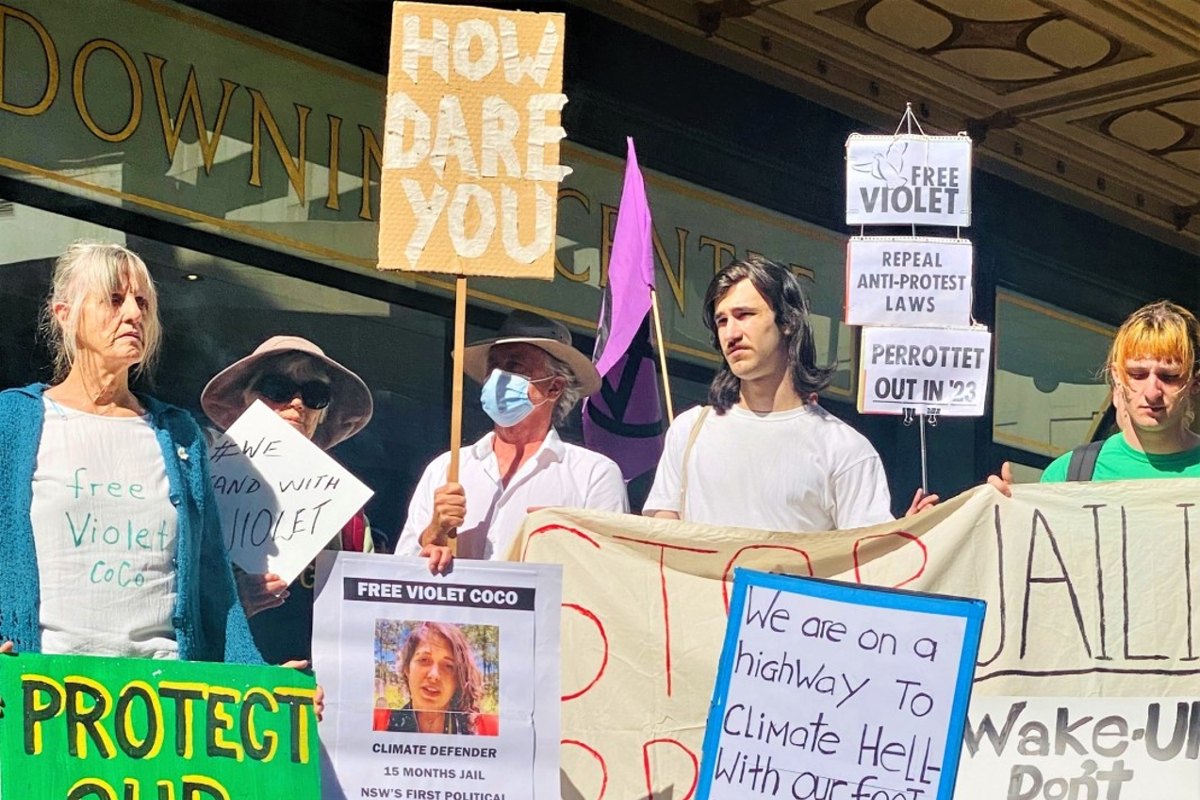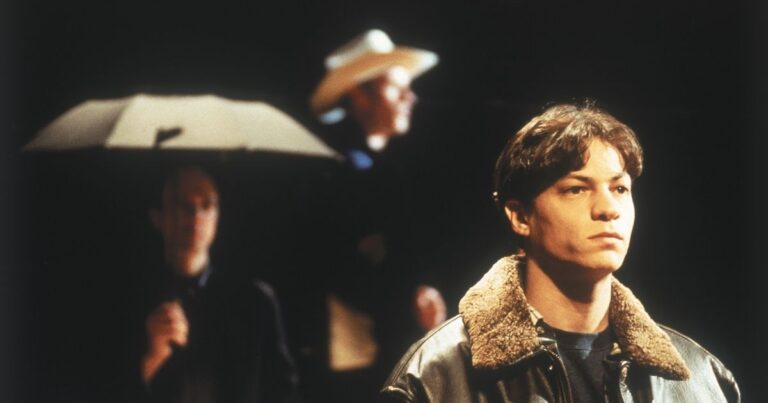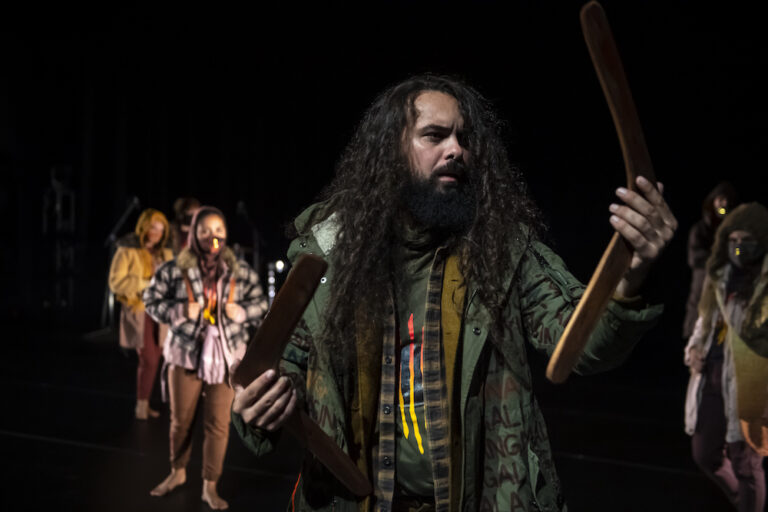
Climate activist Violet Coco freed as campaign to repeal anti-protest laws grows

By WENDY BACON
Climate activist Deanne ‘Violet’ Coco was freed on Tuesday after spending 10 days in Silverwater Women’s Prison, seven of which were in isolation.
On December 2, Coco pleaded guilty to four charges arising out of a Fireproof Australia climate change protest in which she climbed onto a stationary truck, holding a flare and blocking one lane of traffic on Sydney Harbour Bridge for 25 minutes. Magistrate Allison Hawkins sentenced her to a very tough custodial sentence of 15 months, with a 8 months non-parole period. Hawkins then remanded Coco in custody until an appeal in March 2023.
Outside the court, her lawyer Eddie Lloyd told media that the prison conditions were very difficult. Coco had no visitors and was locked in a cell almost 24 hours a day.
This week, the Director of Public Prosecutions lawyer Nicholas Leach again opposed bail. But, NSW District Court Judge Timothy Gartelmann released Coco until her appeal hearing.
Coco’s harsh sentence sent shock waves through climate change and human rights groups around Australia and focussed attention on draconian anti-protest laws that the NSW LNP government rushed through the parliament in April with NSW Labor support. Both major parties continue to support the laws.
Coco was the first person to receive a prison sentence under the new laws. Four other climate activists have been sentenced to prison for other protest offences in NSW this year. There are more than twenty other climate activists arrested under the new anti-protest laws who could also face time in prison.
More than 200 organisations call out increasing repression

By the time Coco appeared in court via audio visual link from prison this week, a massive coalition of 230 organisations representing millions of people had issued a statement calling for the release of Coco and expressing concern about increasing repression, including the introduction of new anti protest laws in several states.
Australian Conservation Foundation, NSW Council for Civil Liberties, Community Legal Centres NSW, Oxfam, Unions NSW, Amnesty International, Asylum Seeker Resource Centre, Climate Council of Australia, Human Rights Law Centre, the Wilderness Society, Pride in Protest are just a few of the organisations that have joined one of the biggest progressive coalitions formed since the Vietnam Moratoriums in the early 1970s.
NSW CCL President Josh Pallas who helped bring the organisations together told City Hub, “While unjust laws which have led to the incarceration of peaceful protesters should never have been passed, they presented an opportunity to galvanise and bring together civil society in defence of the right to protest. … my hope is that this loose coalition continues to grow and defend the right to protest as more people are unjustly brought before the courts.”
Some organisations issued statements.
“Fundamental democratic principles” are being “stripped before our eyes at an alarming rate, “ said Australian Conservation Foundation (ACF) CEO Kelly O’Shanassy.
Amnesty International Australia said, “The right to protest is a human right. No-one should be imprisoned for exercising this right, and Violet’s sentencing represents a concerning escalation in NSW’s crackdown on people’s right to protest, and that of others to address human rights abuses including climate inaction.”
“It’s outrageous that the state wastes resources seeking jail time and locking up peaceful protestors in custody at the expense of taxpayers. In contrast, fossil fuel corporations are contributing to climate collapse, yet have bi-partisan support for further mining and their subsidies continue at a rate of $22,000 a minute,” said Lucy Manne of 350.org.
First Nations organisations also came out in support of civil disobedience. Karly Warner of Aboriginal Legal Service NSW condemned the crackdown.
“The Aboriginal Legal Service was born out of a protest movement in the 1970s. You would be hard-pressed to find any win for Aboriginal and Torres Strait Islander peoples’ rights that wasn’t brought about by public protest. There is no climate justice without racial justice. ..For marginalised communities, public protests enable us to be seen and heard, even – and especially – when those in power would rather suppress our voices,” she said.
Supporters rally outside court
On Tuesday morning, more than 100 protestors including unionists, school and university students, artists and members of groups Amnesty International, Knitting Nanas, Extinction Rebellion gathered outside NSW Downing Court calling for the release of Coco. Several Greens MPs attended including Senators David Shoebridge, Senator Mehreen Faruqi and Newtown MP Jenny Leong.
Senator Shoebridge described how he joined students in protesting outside then Prime Minister’s home Kirribilli House during the 2019 bushfires. He and others were arrested by riot police. He was later acquitted of disobeying a police direction. He told the rally that this experience placed him in a unique position of sitting in the NSW state parliament in April when the anti-protest laws were rushed through parliament. LNP and Labor “wanted to send a chilling message.. they wanted us to be afraid to block coal trains that are destroying our future. They passed laws to make it a crime to fight against climate action but not a crime to receive millions of dollars in donations from fossil fuel companies that are selling out our future. Our laws are cooked and our justice system is broken.” Now a NSW Senator, he said he was hopeful that Coco would receive the same sort of justice that led to him being found not guilty. If state and territory governments refuse to protect the right to protest, he will be pushing for Federal Parliament to pass laws providing for a national right to protest.
Union speakers strongly rejected the notion that unions are protected by a limited and vague section of the protest law that exempts ‘industrial action’ and ‘industrial campaigns’. They declared that they “stand with Violet” and have no desire to be divided from other protesters. Unless they are repealed, they expect the laws will be aimed at them in the future.

‘Why is Violet’s punishment more severe?’ asks co-accused
Jay Larbalastier, another Fireproof Australia activist who was arrested on the same day as Coco, told the crowd that, “while I narrowly avoided a prison sentence. Violet was given a prison sentence for 15 months. For those in power, this was the judicial system working exactly as intended, protecting the rights of extractive industries in order to make obscene profits.”

Larbalastier received a fine and a non-custodial community service order.
DPP fails in attempt to keep Violet Coco in prison
Inside the court, the bail hearing was delayed until the afternoon because Crown lawyers needed more time to sort through documents relating to Coco’s other arrests before they decided whether to oppose bail or not.
At 2 pm, Coco appeared on screen in a small prison cell dressed in a green prison uniform. She looked drained but composed.
DPP lawyer Nicholas Leach opposed bail on two grounds. He argued that Coco was a risk of not turning up to court and a risk of further endangering the community. The judge found the evidence did not support either proposition.
When it became clear that Coco was going to be released, the Crown asked the judge to require two curfews of three hours each to cover daily peak hours. This demand highlights how the state is using legal processes to punish people even before they are sentenced. Coco and Larbalastier both spent several days in police remand cells and many more under ‘house arrest’ of up to 24 hours a day as part of their bail conditions. Before she had even appeared before Hawkins, Coco has spent 2017 hours or 84 days imprisoned at home since her arrest in April.
Again, the judge rejected the idea of ‘a curfew’ and imposed a condition that Coco reside in Sydney and not go within one kilometre of Sydney Harbour Bridge until December 29, after which she will return to her home in East Lismore, on condition she not return to Sydney until her appeal. She must report to police once a week. These conditions are much more in line with normal bail conditions.
Judge Gartlemann mentioned that Coco’s co-offender had not received a jail sentence, and noted a “sentence other than full-time imprisonment may be within range” when the appeal is heard next year.
Violet is a climate warrior, says her lawyer
Outside court, Coco’s lawyer Eddie Lloyd said, “I’m from Lismore and I thank Violet for being so brave, and trying to raise the alarm about the climate emergency that we are in …People like Violet are climate warriors who are brave enough to stand up and try to raise the alarm. Thankfully there’s some justice in this place and we’ve seen that today.” Lloyd, who has previously spoken on the ABC’s Drum program about the destruction and trauma experienced as a result of the North Coast floods, described the laws as a cruel limitation on “our freedom of speech, to express how we feel about what’s going on in the world today”.
Greens NSW Upper House MP Sue Higginson, also a lawyer, was present in Court. She told the media, “The system has failed. Today we have recovered some ground but Violet should not have spent one night in a prison. What we have seen is the NSW Coalition in lockstep with Labor introduce these harsh laws. It’s a moral hysteria and the difficulty is that the system gets caught up in that. No-one should go to prison for peaceful protest… the right to dissent is a very important part of democracy and at the moment, the government is putting that at risk. “
Coco appeared to be in good spirits on Wednesday as she posted a selfie on Facebook after she reported at her local NSW police station but in an interview with the Guardian she acknowledges that being locked down in a 4 by 2 metre concrete cell is challenging. Ironically, exercise opportunities were cancelled because prison officers were on strike. Support building outside helped keep her strong.
Although many supporting her are not currently prepared to risk imprisonment themselves, the actions that Coco and other climate activists take in the face of punitive laws are building a fresh public awareness of the role of civil disobedience in achieving change. This consciousness will grow as more people confront the terrifying scientific fact that current policies to phase out fossil fuels are too weak to limit global warming to 1.5 degrees. The understanding that this will result in millions of lives being lost or disrupted in devastating ways will lead many more people to take action, including by coming up with new ideas for peaceful civil disobedience aimed at bringing about change.
Wendy Bacon is an activist and investigative journalist who was previously the Professor of Journalism at UTS.









